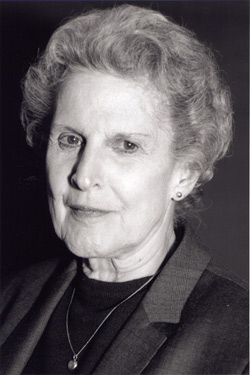TC Remembers Former Library Director Jane Franck
Jane Franck, who served for 25 years as Director of what was then TC’s Milbank Memorial Library, passed away in mid-May.
Franck saw herself as “a guardian of TC’s history,” and TC’s library as “a historical repository that served not only the College, but people around the world,” according to Karen Zumwalt, Professor of Education and a former Dean of the College. Franck wrote a monograph titled “An Almanac for the First Century,” which detailed, in timeline form, key events in the life of both the College and the library. She worked closely with TC’s Art and Art Education Department to use funds donated by the late Colonel Eugene E. Myers (MA ’47) to purchase art materials and resources for the library’s art collection, and she also established the library’s Special Collections Department. The latter included the Chinese education collection that documents TC’s influence, through faculty members John Dewey and Paul Monroe, in China, and the papers of TC faculty member William Heard Kilpatrick, a major figure in the progressive education movement.
“Jane understood the matchless historical collection that TC possessed and felt responsible for preserving it and making it widely available to scholars,” says Professor Emeritus Frances Schoonmaker, former Director of the Preservice Program in Elementary Education and head of the teacher education initiative for the Teachers College/UNICEF Afghanistan Project. “I still recall her excitement when I found a program from the Society of Religious Education with the full text of a keynote speech given by John Dewey. It was tucked away in a collection of ‘various pamphlets,’ and it represented one of the rare occasions when Dewey engaged in dialogue with religious educators.”
The Special Collections Department achieved particular distinction in 1984 during the Soviet invasion of Afghanistan, when the International Rescue Committee appealed to Teachers College for help in locating Dari and Pashto textbooks for Afghan refugee children in its elementary schools in Pakistan. Thirty years earlier, the College’s International Education Department, with funding from USAID, had launched a major project based in Kabul to develop Afghanistan’s education system. The project had produced 142 native language textbooks. Franck and her staff searched the Milbank Library’s collections and found copies of 16 Dari texts the project had developed on language, math and Islamic studies. In a subsequent letter of thanks to the College, IRC Director Charles Sternberg wrote that the Library had “contributed immeasurably to IRC’s work in behalf of children who have been uprooted by war and left without any way of preparing for a productive life.”
Yet as much as she loved history, Franck also anticipated, in ways large and small, directions the library would pursue in the years after her retirement. Maureen Horgan, who recently retired from TC as Associate Director, Administrative Services, after a 45-year career with the library, recalls that Franck “converted the library from the Dewey decimal system to the Library of Congress,” and also that she presided over the installation of the library’s first computers, in 1985, and the first effort to inventory the library’s entire collection. Franck also helped guide the renovation of the ground floor and first three levels.
“She loved books – you could see it in the way that she held books in her hand, especially old ones – but more than that, she loved the ideas that books held,” Schoonmaker says. “She saw the library as the intellectual center of the academic community where imagination could be nurtured.”
Among the many readings and special events Franck brought to the library, perhaps the one she was proudest of was a 1991 talk by Caroline Kennedy and her co-author, Ellen Alderman, about their recent book In Our Defense: The Bill of Rights In Action.
Franck also “saw new technologies as a way of to make ideas accessible,” Schoonmaker says, which is why she was drawn to the emerging cyber world.
“Under Jane, we acquired our online catalogue, which was a very big deal,” recalls Jennifer Govan, Senior Librarian for what is now TC’s Gottesman Libraries. “It was called Innovation Interfaces Inc., or ‘Triple I,’ which we used to joke was the Cadillac of catalogues.”
In 1995, following the death of A. Harry Passow, TC’s great scholar of urban education and the education of gifted children, Franck mounted one of the first widely viewed cyber memorial tributes, creating a site that hosted many of Passow’s speeches and writings and where people could post their own memories of him. She subsequently created online displays about former TC President Lawrence Cremin and founder Grace Hoadley Dodge.
“The Cremin display includes an interview that Cremin did with Richard Heffner on the show ‘The Open Mind,’” recalls Allen Foresta. “That was really a step forward for the library because it was the first time we included video footage online.”
Franck’s love of history and interest in things digital converged perhaps most successfully in one of her last acts as the library’s director: the inclusion of Milbank Library in a partnership formed by Kosovo’s Pristina National and University Library with several U.S. libraries and corporations, as well as with the U.S. Department of State. The partnership established seven Internet information centers in Kosovo aimed at making the Pristina Library the nation’s key information center and historical repository.
Before coming to TC, Franck worked at the Ford Foundation as the Foundation’s representative to the International Federation of Library Associations and Institutions. “She had been on all these incredible trips and had all these amazing art pieces in her office in the library,” Govan says.
Still, Franck considered TC her true home. In 1994, she established the Julie Louise Franck Fellowship, an endowed fellowship in special education, named for her daughter, a TC alumna who had passed away a year before at the age of 37.
Published Thursday, May. 31, 2012
